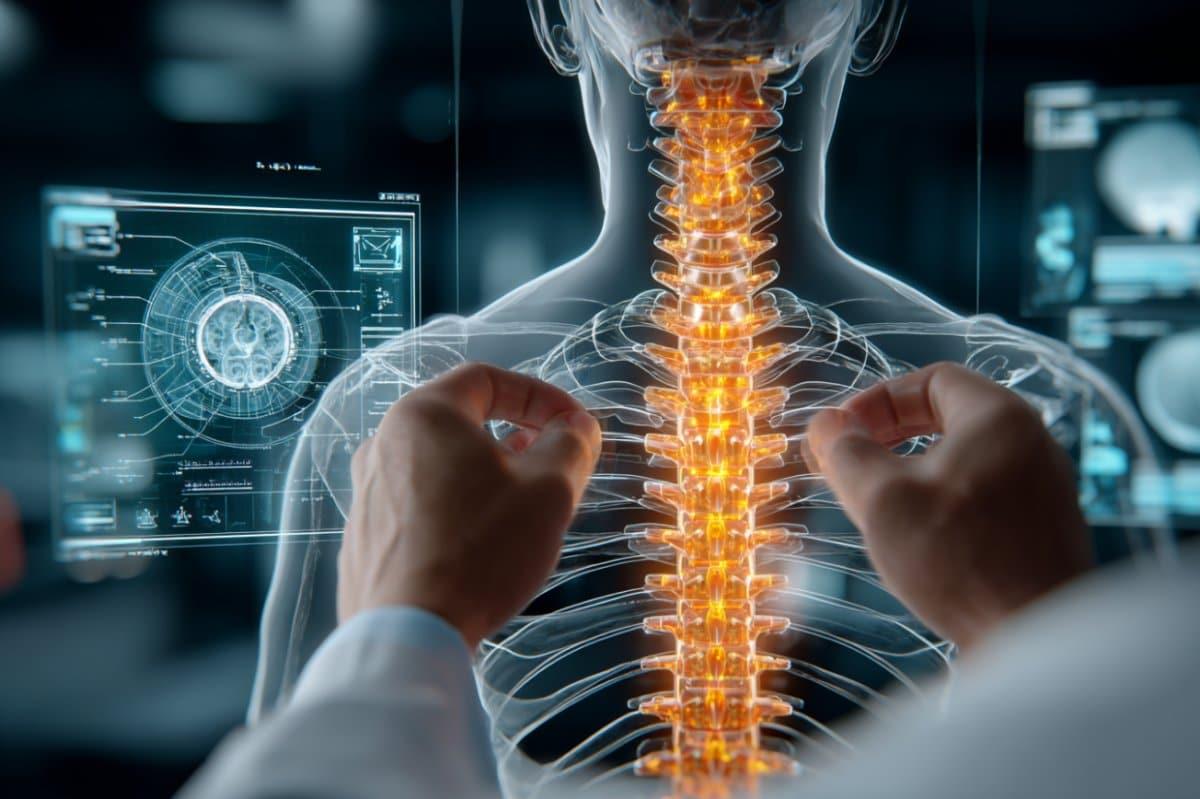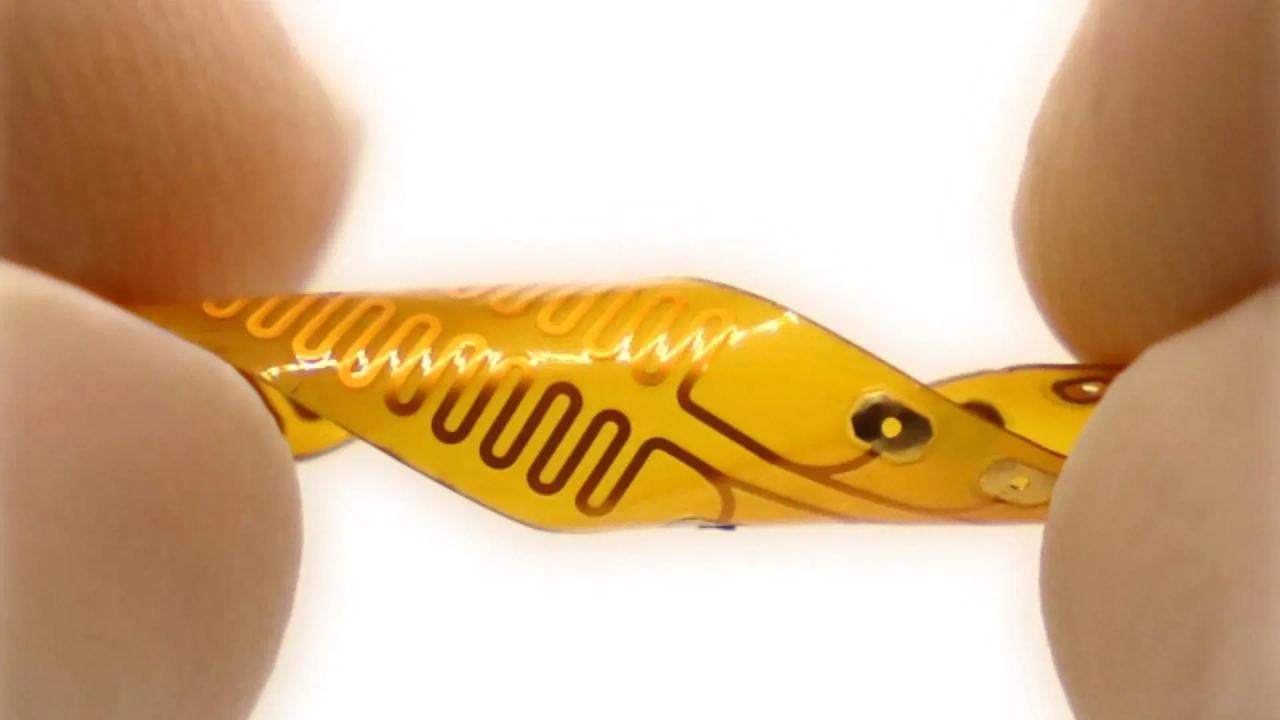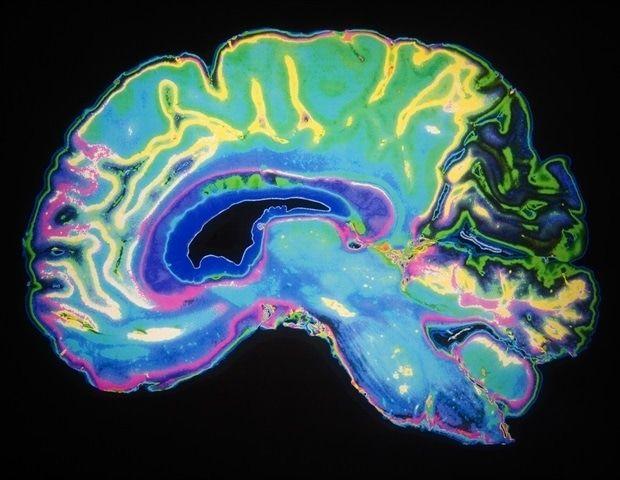World's First Personalized Spine Implant Surgery: AI and 3D Printing Revolutionize Spinal Care
4 Sources
4 Sources
[1]
World's First Personalized Spine Implant Surgery Restores Movement
Summary: Surgeons have performed the world's first anterior cervical spine surgery using a fully personalized implant designed for a patient's unique anatomy. Unlike standard one-size-fits-all devices, the new implant was created with AI-assisted planning and 3D printing, allowing for precise alignment and better structural support. This innovation could reduce complications, improve mobility, and shorten recovery times for people with spinal conditions. Experts say it represents a transformative step toward a future where all orthopedic implants are fully personalized. Key Facts * Personalized Implant: AI and 3D printing created a spine implant tailored to one patient's anatomy. * Better Outcomes: Customization may improve alignment, reduce pain, and speed recovery. * Future Potential: Marks a shift toward personalized implants for spine, hip, and knee surgeries. Source: UCSD UC San Diego Health is the first health system in the world to perform an anterior cervical spine surgery using a fully personalized implant designed for a patient's unique anatomy. The first surgery, performed in July 2025, was an anterior cervical procedure, which involves making an incision in the front (anterior) of the neck, removing a damaged disc, and fusing the adjacent vertebrae together. The procedure includes a standard artificial disc, placed in the space where a damaged disc has been removed. Traditional implants are one-size-fits-all, which can affect alignment, healing, and movement. This new technological approach and implant combines advanced imaging, artificial intelligence (AI), and 3D printing to create a customized implant. "Every spine is unique, just like a fingerprint," said Joseph Osorio, MD, PhD, associate professor of neurological surgery at University of California San Diego School of Medicine and neurosurgeon at UC San Diego Health. "With this technology, we can create an implant specifically for each patient, instead of asking their body to adapt to a standard device. It's a fundamental shift in how we approach complex spine surgery." The neurosurgical team that performed the procedure at UC San Diego Health, led by Osorio, captured detailed scans of the patient's neck to measure the spine precisely. AI-assisted planning then determined the implant design, which was 3D printed in medical-grade titanium for use in the procedure. This level of customization could be life-changing for patients with conditions such as spinal stenosis, degenerative disc disease, or spinal deformities because it allows for more precise spinal alignment, reduced surgical complications, and faster recovery times. By preserving healthy anatomy and improving structural support, patients may regain mobility sooner, experience less pain, and have a lower likelihood of needing additional corrective surgeries, significantly improving quality of life and long-term function. "This is the first step in a larger transformation," said Osorio. "We envision a future where every implant, whether for the spine, hip, or knee, is made for one person, not mass-produced for everyone." Anterior cervical fusion has been performed since the 1950s and remains one of the most common spine procedures, making this achievement a historic first. "This milestone brings the promise of personalized medicine to spine surgery," said Alexander Khalessi, MD, MBA, chair of the Department of Neurosurgery at UC San Diego School of Medicine and neurosurgeon at UC San Diego Health. "This first case exemplifies how device innovation and meticulous surgical technique can restore function for our patients. We are expanding what's possible in the treatment of complex spinal conditions at UC San Diego Health." UC San Diego Health has been recognized as a national leader in neurosurgical modernization. The spine program has earned accreditation from The Joint Commission for excellence in spine surgery, reflecting the health system's commitment to patient safety, quality outcomes, and evidence-based care. About this neurosurgery and AI research news Author: Leslie Aquinde Source: UCSD Contact: Leslie Aquinde - UCSD Image: The image is credited to Neuroscience News
[2]
UC San Diego Health performs world's first personalized spine surgery
University of California - San DiegoAug 28 2025 UC San Diego Health is the first health system in the world to perform an anterior cervical spine surgery using a fully personalized implant designed for a patient's unique anatomy. The first surgery, performed in July 2025, was an anterior cervical procedure, which involves making an incision in the front (anterior) of the neck, removing a damaged disc, and fusing the adjacent vertebrae together. The procedure includes a standard artificial disc, placed in the space where a damaged disc has been removed. Traditional implants are one-size-fits-all, which can affect alignment, healing, and movement. This new technological approach and implant combines advanced imaging, artificial intelligence (AI), and 3D printing to create a customized implant. Every spine is unique, just like a fingerprint. With this technology, we can create an implant specifically for each patient, instead of asking their body to adapt to a standard device. It's a fundamental shift in how we approach complex spine surgery." Joseph Osorio, MD, PhD, associate professor of neurological surgery at University of California San Diego School of Medicine and neurosurgeon at UC San Diego Health The neurosurgical team that performed the procedure at UC San Diego Health, led by Osorio, captured detailed scans of the patient's neck to measure the spine precisely. AI-assisted planning then determined the implant design, which was 3D printed in medical-grade titanium for use in the procedure. This level of customization could be life-changing for patients with conditions such as spinal stenosis, degenerative disc disease, or spinal deformities because it allows for more precise spinal alignment, reduced surgical complications, and faster recovery times. By preserving healthy anatomy and improving structural support, patients may regain mobility sooner, experience less pain, and have a lower likelihood of needing additional corrective surgeries, significantly improving quality of life and long-term function. "This is the first step in a larger transformation," said Osorio. "We envision a future where every implant, whether for the spine, hip, or knee, is made for one person, not mass-produced for everyone." Anterior cervical fusion has been performed since the 1950s and remains one of the most common spine procedures, making this achievement a historic first. "This milestone brings the promise of personalized medicine to spine surgery," said Alexander Khalessi, MD, MBA, chair of the Department of Neurosurgery at UC San Diego School of Medicine and neurosurgeon at UC San Diego Health. "This first case exemplifies how device innovation and meticulous surgical technique can restore function for our patients. We are expanding what's possible in the treatment of complex spinal conditions at UC San Diego Health." UC San Diego Health has been recognized as a national leader in neurosurgical modernization. The spine program has earned accreditation from The Joint Commission for excellence in spine surgery, reflecting the health system's commitment to patient safety, quality outcomes, and evidence-based care. In the 2025-26 U.S. News & World Report "Best Hospitals" rankings, UC San Diego Health's neurology and neurosurgery program was named among the top in the nation, highlighting dedication to research, technology, and interdisciplinary collaboration. The spine program brings together neurosurgeons, orthopedic surgeons, rehabilitation specialists, and pain management experts to provide comprehensive care for every patient, from non-surgical treatments to the most complex procedures. University of California - San Diego
[3]
World's first cervical spine surgery using 3D-printed custom implant
Dr. Joseph Osorio conducted the world's first fully personalized anterior cervical spine implant, created using advanced imaging, AI-assisted planning, and 3D printing. UC San Diego Health has made medical history by performing the world's first anterior cervical spine surgery using a fully personalized implant. Conducted in July 2025, the procedure represents a leap forward in patient-specific care and sets a new standard for how spinal conditions may be treated in the future. Led by neurosurgeon Dr. Joseph Osorio, associate professor of neurological surgery at UC San Diego School of Medicine, the operation employed advanced imaging, artificial intelligence (AI), and 3D printing to craft an implant tailored to the patient's anatomy.
[4]
World's First Custom Anterior Cervical Spine Surgery | Newswise
The custom-designed titanium implant, made to a patient's unique spinal anatomy, represents a breakthrough in personalized anterior cervical spine surgery. Newswise -- UC San Diego Health is the first health system in the world to perform an anterior cervical spine surgery using a fully personalized implant designed for a patient's unique anatomy. The first surgery, performed in July 2025, was an anterior cervical procedure, which involves making an incision in the front (anterior) of the neck, removing a damaged disc, and fusing the adjacent vertebrae together. The procedure includes a standard artificial disc, placed in the space where a damaged disc has been removed. Traditional implants are one-size-fits-all, which can affect alignment, healing, and movement. This new technological approach and implant combines advanced imaging, artificial intelligence (AI), and 3D printing to create a customized implant. "Every spine is unique, just like a fingerprint," said Joseph Osorio, MD, PhD, associate professor of neurological surgery at University of California San Diego School of Medicine and neurosurgeon at UC San Diego Health. "With this technology, we can create an implant specifically for each patient, instead of asking their body to adapt to a standard device. It's a fundamental shift in how we approach complex spine surgery." The neurosurgical team that performed the procedure at UC San Diego Health, led by Osorio, captured detailed scans of the patient's neck to measure the spine precisely. AI-assisted planning then determined the implant design, which was 3D printed in medical-grade titanium for use in the procedure. This level of customization could be life-changing for patients with conditions such as spinal stenosis, degenerative disc disease, or spinal deformities because it allows for more precise spinal alignment, reduced surgical complications, and faster recovery times. By preserving healthy anatomy and improving structural support, patients may regain mobility sooner, experience less pain, and have a lower likelihood of needing additional corrective surgeries, significantly improving quality of life and long-term function. "This is the first step in a larger transformation," said Osorio. "We envision a future where every implant, whether for the spine, hip, or knee, is made for one person, not mass-produced for everyone." Anterior cervical fusion has been performed since the 1950s and remains one of the most common spine procedures, making this achievement a historic first. "This milestone brings the promise of personalized medicine to spine surgery," said Alexander Khalessi, MD, MBA, chair of the Department of Neurosurgery at UC San Diego School of Medicine and neurosurgeon at UC San Diego Health. "This first case exemplifies how device innovation and meticulous surgical technique can restore function for our patients. We are expanding what's possible in the treatment of complex spinal conditions at UC San Diego Health." UC San Diego Health has been recognized as a national leader in neurosurgical modernization. The spine program has earned accreditation from The Joint Commission for excellence in spine surgery, reflecting the health system's commitment to patient safety, quality outcomes, and evidence-based care. In the 2025-26 U.S. News & World Report "Best Hospitals" rankings, UC San Diego Health's neurology and neurosurgery program was named among the top in the nation, highlighting dedication to research, technology, and interdisciplinary collaboration. The spine program brings together neurosurgeons, orthopedic surgeons, rehabilitation specialists, and pain management experts to provide comprehensive care for every patient, from non-surgical treatments to the most complex procedures.
Share
Share
Copy Link
UC San Diego Health performs the world's first anterior cervical spine surgery using a fully personalized implant designed with AI and 3D printing, marking a significant advancement in personalized medicine and spinal care.
Groundbreaking Personalized Spine Surgery
In a world-first medical breakthrough, surgeons at UC San Diego Health have successfully performed an anterior cervical spine surgery using a fully personalized implant designed for a patient's unique anatomy. This pioneering procedure, conducted in July 2025, marks a significant advancement in the field of personalized medicine and spinal care
1
2
3
4
.AI and 3D Printing: The Technological Backbone

Source: Neuroscience News
The innovative approach combines advanced imaging, artificial intelligence (AI), and 3D printing to create a customized implant. Unlike traditional one-size-fits-all devices, this new implant is tailored to the patient's specific spinal structure
1
2
.Dr. Joseph Osorio, the lead neurosurgeon and associate professor at UC San Diego School of Medicine, explains, "Every spine is unique, just like a fingerprint. With this technology, we can create an implant specifically for each patient, instead of asking their body to adapt to a standard device"
2
4
.The Surgical Process

Source: Interesting Engineering
The procedure involves making an incision in the front of the neck, removing a damaged disc, and fusing the adjacent vertebrae. The neurosurgical team captured detailed scans of the patient's neck to measure the spine precisely. AI-assisted planning then determined the implant design, which was 3D printed in medical-grade titanium for use in the procedure
2
4
.Potential Impact on Patient Care
This level of customization could be life-changing for patients with conditions such as spinal stenosis, degenerative disc disease, or spinal deformities. The personalized approach allows for:
- More precise spinal alignment
- Reduced surgical complications
- Faster recovery times
- Improved mobility
- Less pain
- Lower likelihood of needing additional corrective surgeries
1
2
4
Dr. Alexander Khalessi, chair of the Department of Neurosurgery at UC San Diego School of Medicine, states, "This milestone brings the promise of personalized medicine to spine surgery. This first case exemplifies how device innovation and meticulous surgical technique can restore function for our patients"
2
4
.Related Stories
Future Implications

Source: News-Medical
The success of this procedure opens up possibilities for wider applications in orthopedic surgery. Dr. Osorio envisions "a future where every implant, whether for the spine, hip, or knee, is made for one person, not mass-produced for everyone"
2
4
.UC San Diego Health: A Leader in Neurosurgical Innovation
UC San Diego Health has been recognized as a national leader in neurosurgical modernization. Their spine program has earned accreditation from The Joint Commission for excellence in spine surgery, reflecting the health system's commitment to patient safety, quality outcomes, and evidence-based care
2
4
.In the 2025-26 U.S. News & World Report "Best Hospitals" rankings, UC San Diego Health's neurology and neurosurgery program was named among the top in the nation, highlighting their dedication to research, technology, and interdisciplinary collaboration
2
4
.This groundbreaking surgery represents a transformative step toward a future where all orthopedic implants are fully personalized, potentially revolutionizing the field of spinal care and improving outcomes for patients worldwide.
References
Summarized by
Navi
[1]
[3]
Related Stories
Recent Highlights
1
ByteDance's Seedance 2.0 AI video generator triggers copyright infringement battle with Hollywood
Policy and Regulation

2
Demis Hassabis predicts AGI in 5-8 years, sees new golden era transforming medicine and science
Technology

3
Nvidia and Meta forge massive chip deal as computing power demands reshape AI infrastructure
Technology








